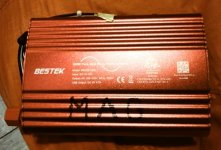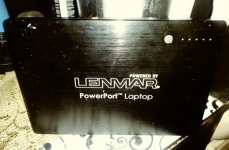Hello All.
I have a 12 VDC to 120VAC power inverter I want to run with a LioN 16/20VDC battery. The inverter can only take 13VDC Max. input voltage. What is the best way to reduce this batteries voltage to 12VDC while still maintaining maximum current capability.
The power inverter will be powering a 140W bass amplifier head. I have another identical battery I can hook up in parallel if necessary but I want to see if one can handle it. A low value High wattage resistor in series?
Thanks.
I have a 12 VDC to 120VAC power inverter I want to run with a LioN 16/20VDC battery. The inverter can only take 13VDC Max. input voltage. What is the best way to reduce this batteries voltage to 12VDC while still maintaining maximum current capability.
The power inverter will be powering a 140W bass amplifier head. I have another identical battery I can hook up in parallel if necessary but I want to see if one can handle it. A low value High wattage resistor in series?
Thanks.
Attachments
Hi . Are you sure ,your inverter can't handle more than 13v dc input ? This voltage range looks like desiged for 12v car battery , which normally goes up to 14,4 and little more volts when fully charged. I think you should look inside converter for 16v rated big capacitors and replace them to 25 v rated at least. Also check for mosfets voltage rating , should be more than twice your wanted input voltage , so let's say 50v. If you just need to test 120v equipment with battery and converter ,resistor is worst idea. Better then use cheap dc-dc step down buck converter 20amp rated , it will transfer higher voltage to lower and increase amperage , they are very efficient. Also you may try a lot of diodes on big heatsinks ,but voltage will be unstable , one diode will drop 0,5-1v depending on model and current . Use 20a diodes then.
Something like this would do it. 20A300W Step Down Buck-Boost Power Adjustable Charger Board DC-DC Converter Tool | eBay
Cheap and straightforward.
Cheap and straightforward.
Indeed, automotive products like that should be able to take 16 volts.
A fully chanrged car battery is about that same voltage.
A fully chanrged car battery is about that same voltage.
4 diodes in series gives You 2V Voltage drop. That would be in the 14V range.
Car alternators have built-in regulators, perhaps You can use one of these.
Car alternators have built-in regulators, perhaps You can use one of these.
I guess you have 5 Lion cells in series inside your "16/20V" battery pack.
Mod it or get another with *four* cells, for nominal "12/16V" which will be acceptable for your inverter.
Using : wrong battery+stepdown+wrong inverter is clumsy and klunky, to say it politely.
Do it right from the start.
That said, doubt you get much playing time driving a 140W (so 200W consumption) Bass amplifier.
Best is to make a straight DC to DC converter from 12V (or whatever your battery pack has) to whatever amp rails are (guess around 45+45V DC) in a single stage, instead of the clumsy stepdown+inverter+original amp supply with losses every step of the way.
FWIW, the right way is what car amps do.
Mod it or get another with *four* cells, for nominal "12/16V" which will be acceptable for your inverter.
Using : wrong battery+stepdown+wrong inverter is clumsy and klunky, to say it politely.
Do it right from the start.
That said, doubt you get much playing time driving a 140W (so 200W consumption) Bass amplifier.
Best is to make a straight DC to DC converter from 12V (or whatever your battery pack has) to whatever amp rails are (guess around 45+45V DC) in a single stage, instead of the clumsy stepdown+inverter+original amp supply with losses every step of the way.
FWIW, the right way is what car amps do.

